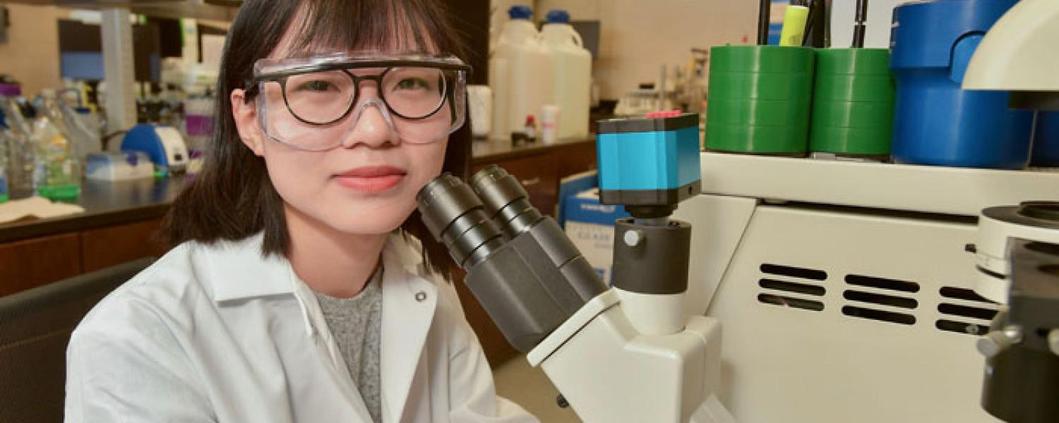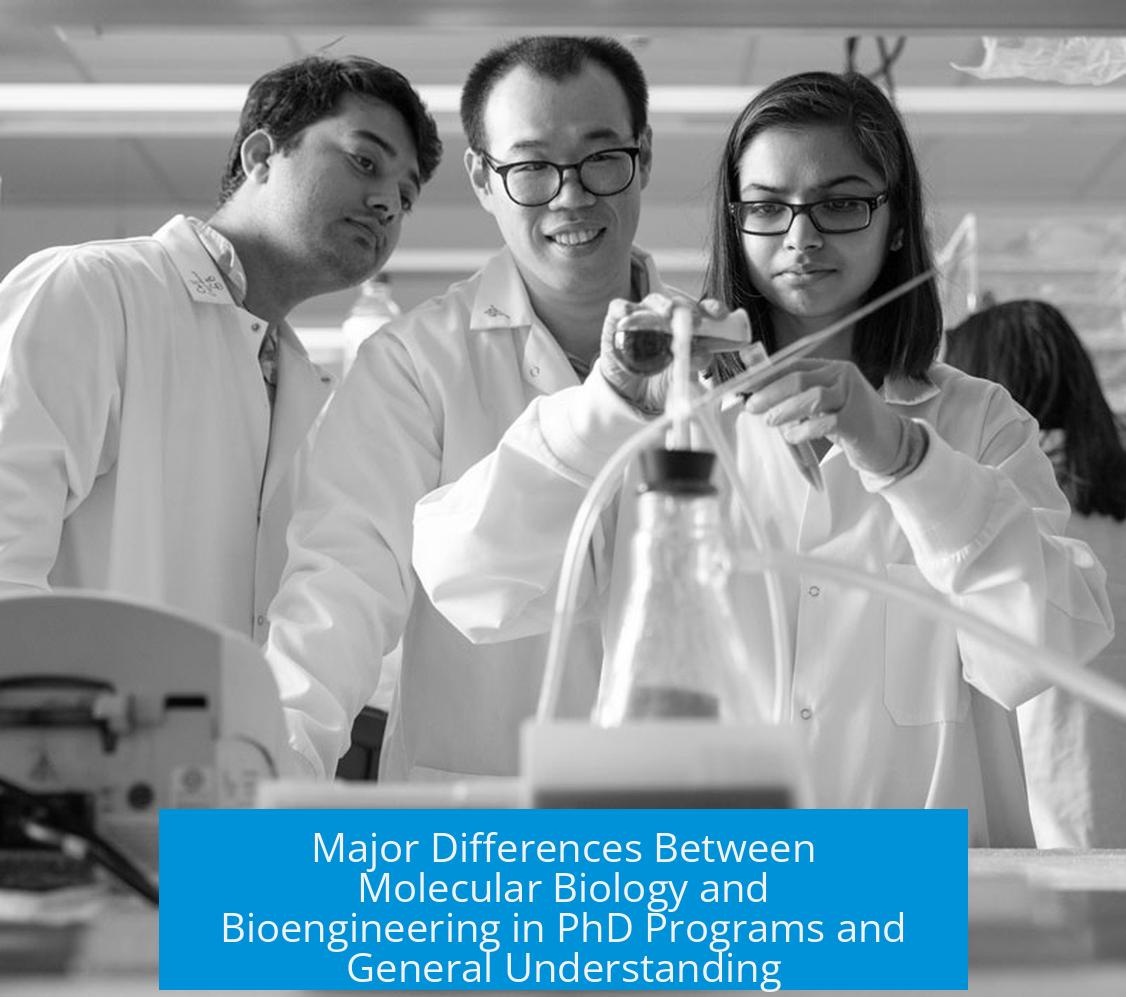Major Differences Between Molecular Biology and Bioengineering for PhD Programs and General Understanding

Molecular biology and bioengineering represent two distinct but overlapping scientific fields. The key differences lie in their focus of research, lab work, academic pathways, and specialization. While both fields offer robust career opportunities, their approaches and training significantly differ.
1. Focus of Laboratory Work
Molecular biology centers on the study of living cells and organisms. Research is primarily based on understanding biological processes as they naturally occur in cellular environments. This field seeks to unravel how molecules like DNA, RNA, and proteins function inside the cell. Labs typically involve working directly with tissue samples, cells, or whole organisms.
In contrast, bioengineering emphasizes working with artificial systems in controlled environments. Early-stage research often uses engineered components or synthetic models rather than living cells. Once concepts are validated in simplified systems, these are sometimes applied or tested within living cells or organisms. The field integrates principles from engineering, physics, and biology to design devices, materials, or systems that influence biological function.
- Molecular Biology: Cell- and organism-based experimentation.
- Bioengineering: Lab work with isolated artificial or synthetic systems initially.
2. Breadth of Skills and Specialization
Molecular biology PhD training tends to provide skills that are broad and applicable across various research areas. Although students do specialize during their doctoral studies, the techniques learned—such as molecular cloning, PCR, or protein analysis—are widely transferable to different biological domains.
Bioengineering students often develop deep expertise in specialized technical fields. Their training focuses on precise engineering applications, sometimes narrowing their research to specific technologies such as biomaterials, tissue engineering, or medical device design. The nature of bioengineering requires mastering discipline-specific quantitative and technical skills.
- Molecular Biology: Transferable lab techniques with moderate specialization.
- Bioengineering: Deep specialization in engineering-oriented biological systems.
3. Coursework and Academic Background
PhD programs in these disciplines differ in coursework and admission profiles, especially in regions like the United States where program structures vary by institution. Coursework in bioengineering typically includes more mathematical and quantitative subjects. Examples include systems modeling, computational simulations, and engineering principles relevant to biological contexts.
Molecular biology programs mainly encompass fundamental biological sciences such as genetics, biochemistry, and cell biology. These emphasize conceptual understanding of life processes over applied engineering methods.
The applicant pool also varies: bioengineering PhD applicants commonly have backgrounds in engineering fields—biomedical, chemical, electrical, or mechanical. Molecular biology candidates generally stem from life sciences like biology, biochemistry, or microbiology.
| Aspect | Molecular Biology | Bioengineering |
|---|---|---|
| Coursework Focus | Biological sciences, lab techniques | Mathematics, engineering concepts, computational models |
| Typical Applicant Background | Biology, biochemistry | Engineering fields |
| Lab Environment | Living cells, organisms | Artificial systems, devices |
4. Types of Research Laboratories
The nature of labs a student joins reflects these disciplinary differences. Molecular biology research often takes place in labs focused on basic biological questions. These include gene expression, signal transduction, protein interactions, metabolic pathways, and cellular responses.
Bioengineering labs have a wider scope of applications often geared toward translational or applied sciences. These include designing bio-compatible materials, engineering medical devices, developing diagnostic tools, or creating synthetic biological systems—all aimed at solving practical problems in healthcare or industry.
Examples:
- Molecular Biology Labs: Investigate DNA repair mechanisms or protein folding in cells.
- Bioengineering Labs: Develop artificial organs or bio-sensors using engineered materials.
5. Career Prospects and Choosing a PhD Program
Job opportunities after PhD training in either molecular biology or bioengineering are generally promising and comparable. Both domains offer roles in academia, pharmaceutical and biotech industries, medical device companies, and government research labs.
The choice between these fields should primarily depend on personal interests and the type of research work preferred. Prospect students are advised to:
- Identify labs conducting research aligned with their passions.
- Reach out to potential advisors for insights and recommendations on appropriate program choices.
- Consider the balance between theoretical understanding and practical engineering applications they wish to pursue.
Summary of Key Differences
- Lab Focus: Molecular biology works with living cells; bioengineering uses artificial systems.
- Specialization: Molecular biology offers broad techniques; bioengineering leads to deeper field-specific expertise.
- Coursework: Bioengineering involves more math and engineering; molecular biology emphasizes biology and biochemistry.
- Applicant Backgrounds: Molecular biology attracts life science majors; bioengineering applicants are mostly engineers.
- Research Environments: Molecular biology focuses on fundamental biology; bioengineering targets applied technologies.
- Career Outlook: Both fields provide good employment but differ in research and development focus.
What distinguishes the lab work focus between molecular biology and bioengineering PhD programs?
Molecular biology involves studying actual processes inside living cells and organisms. Bioengineering centers on working with artificial systems before applying findings to cell models.
How do specialization and skill transfer differ in these fields?
Molecular biology skills are versatile and can apply across various research areas. Bioengineering PhDs tend to specialize more deeply in a narrow area or ‘lane.’
What are the key differences in coursework and applicant backgrounds?
- Bioengineering courses usually include more math and quantitative work.
- Applicants to bioengineering often come from engineering, while molecular biology attracts life science backgrounds.
- Coursework also varies significantly between universities.
How do research lab types vary between molecular biology and bioengineering?
Bioengineering labs often focus on applied research like medical devices. Molecular biology labs usually explore fundamental biological science within living systems.
Do job prospects differ significantly between the two PhD fields?
Both offer similar career opportunities. The best choice depends on your interests and the labs conducting research you want to join.





Leave a Comment